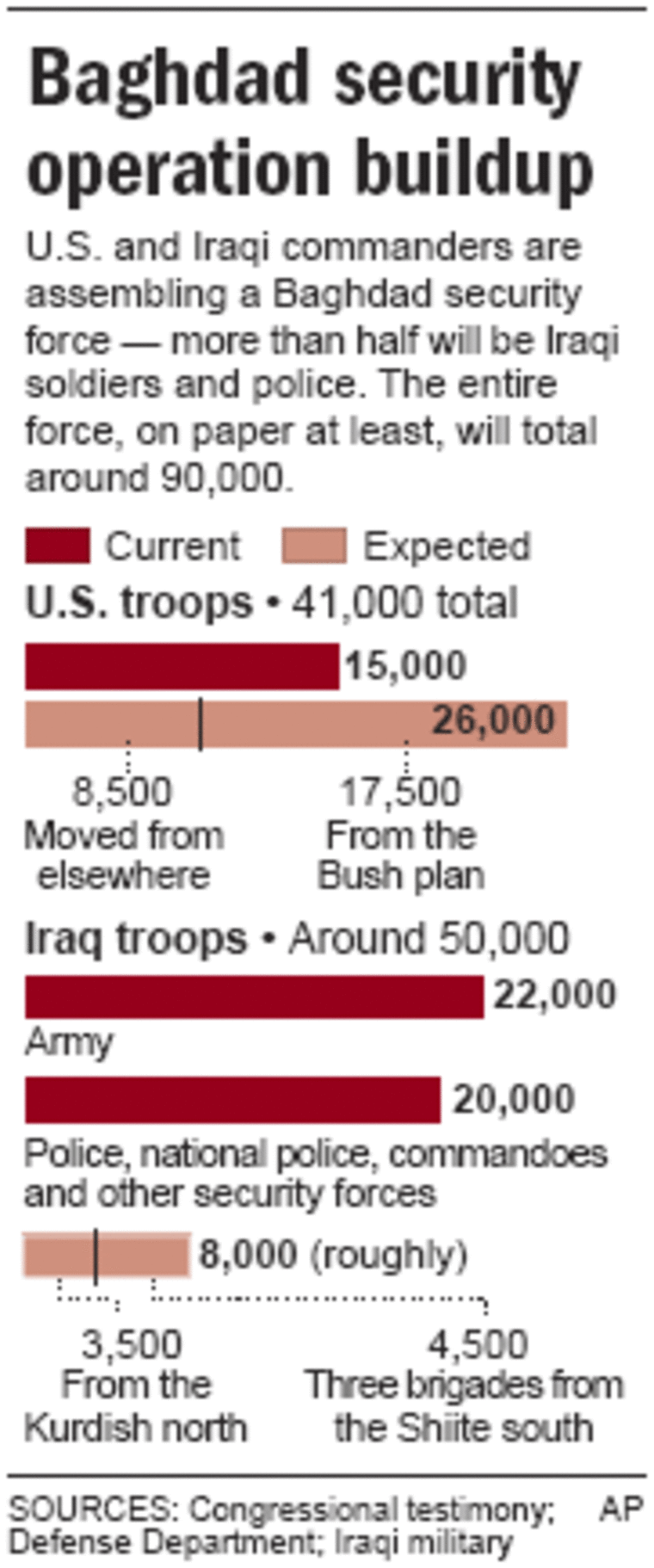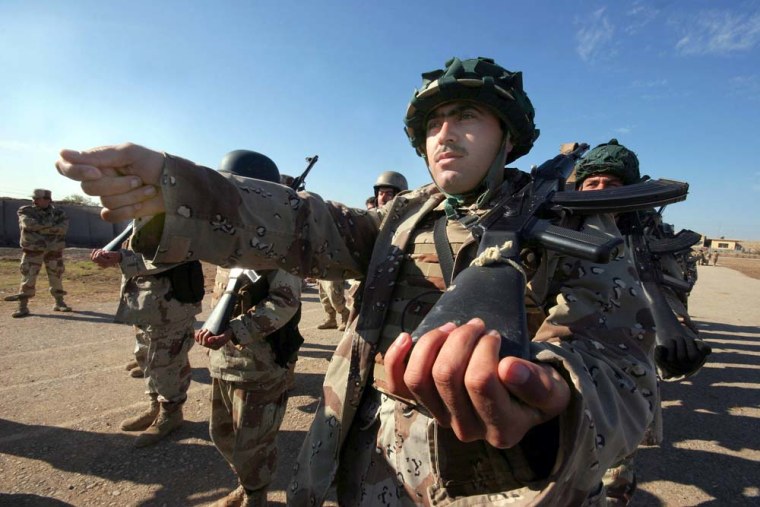U.S. Army engineers have torn down houses and surrounded the newly cleared space with razor wire atop concrete blast walls for neighborhood bases, the first outward signs of the coming Baghdad security crackdown.
American and Iraqi commanders are pulling together a force that numbers — on paper at least — about 90,000 troops for what many see as a last-chance drive to curb the debilitating violence that has turned Baghdad into a battleground and killed — according to the United Nations — more than 34,000 civilians last year alone.
“This will be a difficult mission and time is not on our side,” Lt. Gen. David Petraeus, who will soon take over the U.S. command in Iraq, said in written testimony to the Senate Armed Services Committee last month.
In the past eight months, two U.S.-Iraqi security missions have failed to rout gunmen, bombers, suicide attackers and the death squads that haunt Baghdad’s streets after dark. The U.S. military blamed Iraq’s Shiite-dominated government for its inability to muster sufficient troops.
Of the 90,000-troop force now assembling for a new try at calming the capital, more than half were to be Iraqi soldiers and police, a large majority of whom are Shiite Muslims.
Shiites battling Shiites
It remains an open question whether those forces will be any more inclined this time to battle heavily armed fellow Shiite militiamen or Sunni insurgents, including al-Qaida in Iraq and its suicide bombers.

This operation to sweep the capital of Sunni insurgents and Shiite militiamen was widely expected to begin early this month. But a senior Iraqi general told The Associated Press this week that “preparations are not complete.”
The general refused to say how many of an expected influx of about 8,000 Iraqi forces had arrived — as advertised — from the Kurdish north, the Shiite south or Fallujah, in the insurgent stronghold of Anbar province west of Baghdad.
Local commanders, however, said only about 2,000 of the additional troops had reached Baghdad or were nearby. The general and the commanders all spoke on condition of anonymity because of security reasons.
The Baghdad security plan, announced Jan. 6 by Prime Minister Nouri al-Maliki and four days later by President Bush, includes an infusion of 21,500 additional American troops to Iraq, 17,500 of them to Baghdad.
The U.S. Congress, with a new Democratic majority, has been embroiled for weeks in debate about sending more Americans to a conflict that already has stretched to nearly four years and taken the lives of nearly 3,100 U.S. service members and hundreds more American contract workers.
And departing U.S. commander Gen. George Casey told a Senate panel Thursday he didn’t think such a large additional force was necessary.
“I believe that the job in Baghdad, as it’s designed now, can be done with less than that,” Casey said. “But having the flexibility to have the other three brigades on a deployment cycle gives us and gives Gen. Petraeus great flexibility.”
Troop surge throughout
U.S. and Iraqi officials say the United States plans to have about 41,000 troops in Baghdad and the region when all additional 17,500 American forces arrive by late spring. There are currently about 15,000 in and around the capital and an estimated 8,500 were expected to arrive from other parts of the country.
The Iraqis say they have about 22,000 troops in the capital, more than half at the airport and in two nearby towns. There about 20,000 police and Interior Ministry troops and commandos also in the city, according the Defense and Interior ministries. The additional 8,000 scheduled to arrive from elsewhere would put the total Iraqi forces at about 50,000.
But the overall Iraq troop count is an extrapolation from the number of battalions deployed or on the way. Experience has shown far fewer troops show up.
“The Iraqi numbers are probably inflated. Battalions that should contain 800 men usually have no more than 200-300, if that,” said retired Army Col. Douglas Macgregor, an adviser to former Defense Secretary Donald H. Rumsfeld in 2003.
An Iraqi army brigade from Irbil, about 3,500 men in principle, will have at most 1,500 men when it finally arrives in Baghdad. The commander says 95 percent of the men don’t speak Arabic. A brigade from Sulaimaniyah, also in the Kurdish north, has reached the Muthana Airport in central Baghdad, but it is only 1,000-men strong, not the expected 3,000.
Three brigades each were expected from the 8th and 10th army divisions in the south of the country. Some of the troops have reached positions outside Baghdad, but their force-strength was not known.
Iraqi soldiers' whereabouts often unknown
U.S. military officials have said that about one-third of any Iraqi unit is missing at any given time because soldiers must return to their home towns and villages to deliver their paychecks to families. Iraq’s banking system is too primitive to allow the electronic transfer of money.
And those absences do not include soldiers missing because they don’t want to serve in a particular mission. There are no laws against failure to muster for the country’s new, volunteer force.
But U.S. preparations were moving ahead in Baghdad.
In the tough Ghazaliyah neighborhood, a Sunni enclave in northwest Baghdad, Army engineers put up the concrete blast walls topped with razor wire to enclose a region where six homes were cleared. The area, including open space surrounding the structures, will house the 1st Cavalry Division’s Company C, 2nd Battalion, 12th Cavalry Regiment.
“Command Outpost Wildcard is under construction to allow soldiers to quickly respond to violence and crime in the area. The former residents of the homes were paid to vacate the area homes and have relocated,” the military said in a statement. It could not be learned what compensation was paid to those who surrendered their homes.
More troops coming each month
A brigade of the 82nd Airborne has arrived in Baghdad as part of the Bush-ordered infusion of troops. Four more brigades were to arrive between now and the end of May. The next arriving unit was to be the 4th Brigade, 1st Infantry Division, based at Ft. Riley, Kan., which will deploy in February.
The 3rd Brigade, 3rd Infantry Division, based at Ft. Benning, Ga., will deploy in March. The 4th Stryker Brigade, 2nd Infantry Division, based at Ft. Lewis, Wash., in April, and the 2nd Brigade, 3rd Infantry Division, based at Ft. Stewart, Ga., in May.
The Marine Corps will extend two reinforced infantry battalions for approximately 60 days. Additionally, the 15th Marine Expeditionary Unit (Special Operations Capable) will remain in Iraq for approximately 45 additional days. The 1st Brigade, 34th Infantry Division, Minnesota Army National Guard, will be extended in its current mission for up to 125 days and will redeploy not later than August.
